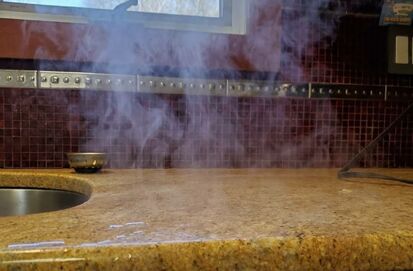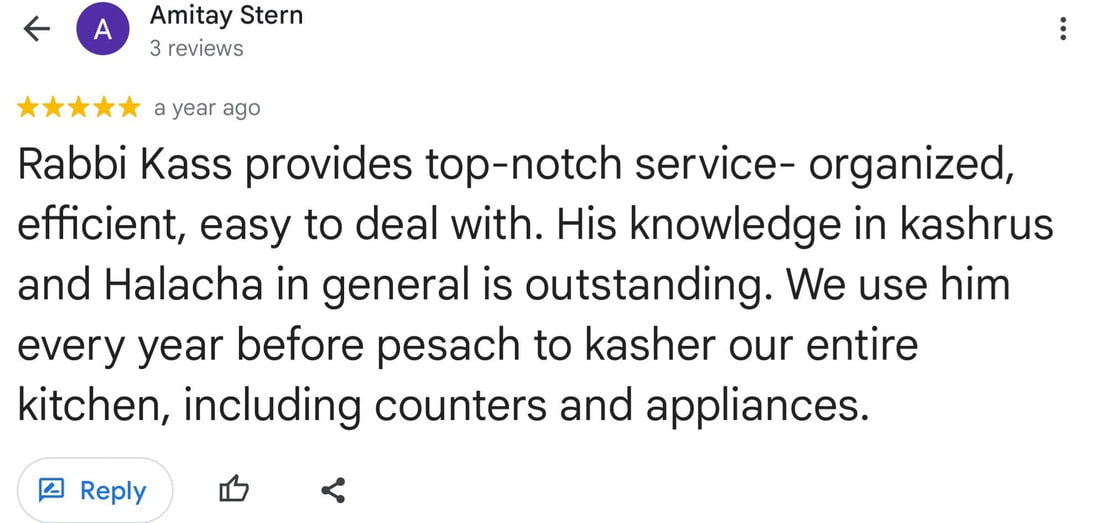MAKING YOUR KITCHEN KOSHERKoshering, or also known as Kashering your kitchen, for many is a daunting task.
What can be Koshered / Kashered? What are the correct methods? How do I do it? In addition, Kashering is often necessary when moving into a new home or before Pesach which can be very stressful and busy times. Based out of Monsey NY we are experts at Kashering your kitchen. A competent Rabbi will come to your home to do all the Koshering for you and do it right. In addition to our Kashering service for new homes we also have an add on service for Mezuzahs, see links for Mezuzah purchase and Mezuzah installation. Take advantage and save. About UsOur Team has 10+ years Kashering experience
Rabbi Kass was ordained by Rabbi Yisrael Meir Lau, former Ashkenazik Chief Rabbi of Israel. As well He is a certified as a Sofer by one of the leading experts in Safrus, Rabbi Avrohom Tzvi Vosner, Rav of the Vad Mishmeres Sta”m. And is the owner and operator of The Sofer Center a Sofer Stam in Monsey Ny. |
|
Contact / ScheduleRates / CostEvery Kashering job is unique as there are many variables such as Kitchen size and appliances. Our Kashering Service works on an hourly rate. To get a quote for the cost of Kashering your Kitchen please contact us directly. |
Service Area
Testimonials from Google
WHY KEEP KOSHER

The ultimate answer to your question is "because God said so." Beyond this, however, there are practical, observable benefits to keeping kosher today:
1) Spirituality: The Torah teaches that non-kosher food has a negative effect on a Jewish soul. The soul is like an antenna that picks up waves of spiritual energy. Eating non-kosher food damages the capacity of the soul to "connect spiritually."
2) Self Growth: If you can be disciplined in what and when you eat, it follows that you can be disciplined in other areas of life as well. Kashrus requires that one must wait between milk and meat, and we may not eat certain animals or combinations of foods. All of this instills self-discipline, and enables us to elevate our spiritual side, by making conscious choices over animal urges.
3) Health Reasons: With its extra supervision, Kosher food is perceived as being healthier and cleaner. After slaughter, animals are checked for abscesses in their lungs or other health problems. Blood – a medium for the growth of bacteria – is drained. Shellfish, mollusks, lobsters and crabs have spread typhoid and are a source for urticaria (a neurotic skin affliction). Milk and meat digest at an unequal rate and are difficult for the body. And of course, pigs can carry trichinosis.
4) Moral Lessons: We are taught not to be cruel – even to animals. A mother and her young are forbidden to be slaughtered on the same day, and we "don't boil a kid (goat) in its mother's milk." We must not remove the limb of an animal while it is still alive (a common practice, prior to refrigeration). When we slaughter an animal, it must be done with the least possible pain. And we are reminded not to be vicious, by the prohibition to eat vicious birds of prey.
5) Tradition: One of the keys to making a Jewish home "Jewish" is the observance of keeping kosher. When we keep kosher in the home, our attachment to Judaism and the sacrifices that we make become ingrained on our children's minds forever. And with food so often the focus of social events, keeping Kosher provides a built-in hedge against assimilation. For many, the bridge between past and future is the spiritual aroma of a kosher kitchen.
1) Spirituality: The Torah teaches that non-kosher food has a negative effect on a Jewish soul. The soul is like an antenna that picks up waves of spiritual energy. Eating non-kosher food damages the capacity of the soul to "connect spiritually."
2) Self Growth: If you can be disciplined in what and when you eat, it follows that you can be disciplined in other areas of life as well. Kashrus requires that one must wait between milk and meat, and we may not eat certain animals or combinations of foods. All of this instills self-discipline, and enables us to elevate our spiritual side, by making conscious choices over animal urges.
3) Health Reasons: With its extra supervision, Kosher food is perceived as being healthier and cleaner. After slaughter, animals are checked for abscesses in their lungs or other health problems. Blood – a medium for the growth of bacteria – is drained. Shellfish, mollusks, lobsters and crabs have spread typhoid and are a source for urticaria (a neurotic skin affliction). Milk and meat digest at an unequal rate and are difficult for the body. And of course, pigs can carry trichinosis.
4) Moral Lessons: We are taught not to be cruel – even to animals. A mother and her young are forbidden to be slaughtered on the same day, and we "don't boil a kid (goat) in its mother's milk." We must not remove the limb of an animal while it is still alive (a common practice, prior to refrigeration). When we slaughter an animal, it must be done with the least possible pain. And we are reminded not to be vicious, by the prohibition to eat vicious birds of prey.
5) Tradition: One of the keys to making a Jewish home "Jewish" is the observance of keeping kosher. When we keep kosher in the home, our attachment to Judaism and the sacrifices that we make become ingrained on our children's minds forever. And with food so often the focus of social events, keeping Kosher provides a built-in hedge against assimilation. For many, the bridge between past and future is the spiritual aroma of a kosher kitchen.













